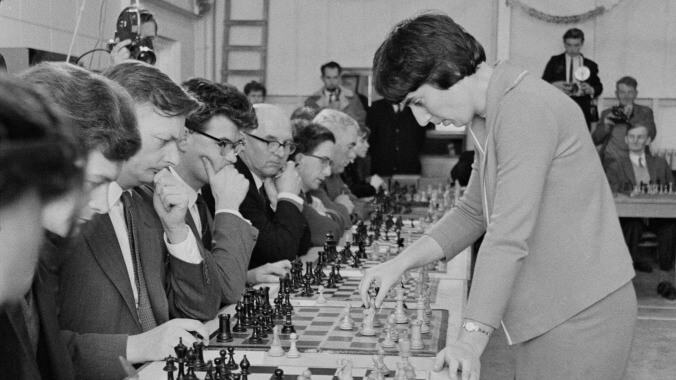Check: Netflix sued by chess icon over a line in The Queen's Gambit
Georgian chess champion Nona Gaprindashvili is suing the streaming platform for defamation

With the Emmys around the corner, Netflix has been decked by a $5 million lawsuit for defamation involving one line in the finale of the highly popular and Emmy-nominated The Queen’s Gambit. The suit has been filed by chess champion Nona Gaprindashvili, who claims Netflix knowingly diminished her achievements in the show to make those of its fictional protagonist, Beth Harmon (Anya Taylor-Joy), seem more impressive by contrast.
The line in question is spoken during the miniseries’ finale, “End Game,” in which Beth competes in a high stakes competition in Moscow. “The only unusual thing about her, really, is her sex, and even that’s not unique in Russia,” a commentator quips during a match. “There’s Nona Gaprindashvili, but she’s the female world champion and has never faced men.” In particular, the last part about never playing against men that really rubs Gaprindashvili the wrong way.
“Gaprindashvili is a pioneer of women’s chess and a much-loved icon in her native country of Georgia,” the 25-page suit states. “Throughout her extraordinary career, she won many championships, beat some of the best male chess players in the world, and was the first woman in history to achieve the status of international chess grandmaster among men.”
While Beth Harmon is purely a fictional character, Gaprindashvili is very much a real woman, who broke barriers in the chess world during the ’60s. The Georgia-born world champion, now 80 years old, was the women’s world chess champion from 1978. In 1978, she was awarded the title Grandmaster.
The suit also acknowledges Gaprindashvili’s achievements no doubt inspired Walter Tevi’s 1983 novel on which The Queen’s Gambit is based. Both the novel and the series trace Beth’s life, beginning with her youth in a Kentucky orphanage. With the help of a mentor, she discovers a talent and passion for the game of chess, and the addictive nature of the pills given to her daily at the orphanage. The series follows her as she climbs the chess rankings, all while battling addiction and the struggles that come with the true gift of genius. The suit claims that unlike Tevi’s novel, which only casually mentions Gaprindashvili, Netflix knowingly took license and wrote the false claim.
“These facts were well known to Netflix, both from the Novel which stated that she had ‘met all these Russian Grandmasters many times before,’ and because it had hired two of the world’s leading chess authorities as consultants for the Series: the legendary Garry Kasparov, a Russian former world champion, and American national master Bruce Pandolfini, considered to be America’s most experienced chess teacher and a consultant to Tevis when he wrote the Novel.”
Now since The Queen’s Gambit is set in the ’60s, you may think: Well maybe Gaprindashvili had not played a male chess player at that point? Not quite.
“The allegation that Gaprindashvili ‘has never faced men’ is manifestly false, as well as being grossly sexist and belittling. By 1968, the year in which this episode is set, she had competed against at least 59 male chess players (28 of them simultaneously in one game), including at least ten Grandmasters of that time, including Dragolyub Velimirovich, Svetozar Gligoric, Paul Keres, Bojan Kurajica, Boris Spassky, Viswanathan Anand and Mikhail Tal. The last three were also world champions during their careers.”
And to what end the suit claims? To uplift a fictional character by dragging a real one down.
“Netflix brazenly and deliberately lied about Gaprindashvili’s achievements for the cheap and cynical purpose of ‘heightening the drama’ by making it appear that its fictional hero had managed to do what no other woman, including Gaprindashvili, had done. Thus, in a story that was supposed to inspire women by showing a young woman competing with men at the highest levels of world chess, Netflix humiliated the one real woman trail blazer who had actually faced and defeated men on the world stage in the same era.”
Gaprindashvili claims she first went to Netflix after the show aired in 2020, asking them to acknowledge the statement was false, offer an apology, and retract the line. She says she was met with “extraordinary hubris,” and Netflix dismissed her claim as “innocuous.” Following today’s suit filing, Netflix did not have too much to say.
“Netflix has only the utmost respect for Ms. Gaprindashvili and her illustrious career, but we believe this claim has no merit and will vigorously defend the case,” a spokesperson told Deadline.